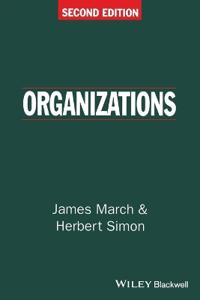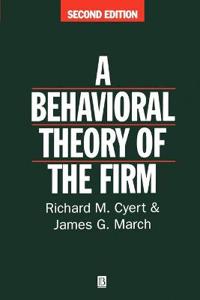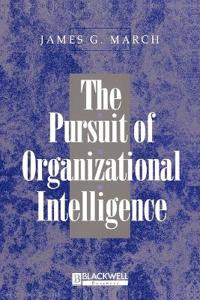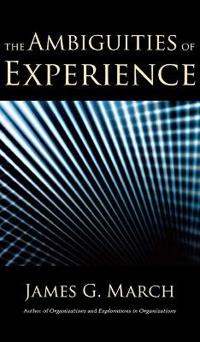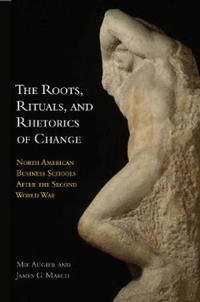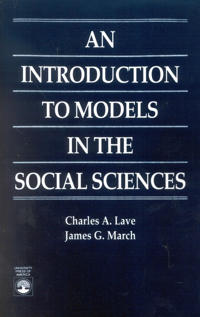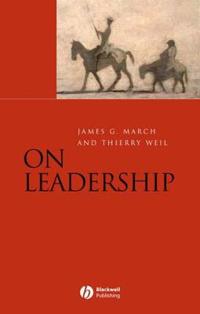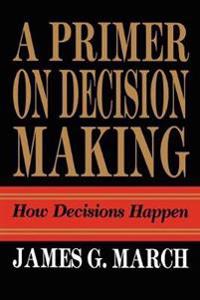Organizations (Pocket)
avJames G. March, Herbert A. Simon, James G. March
ISBN: 9780631186311 - UTGIVEN: 199306This new edition places the material in its contemporary context, whilst still preserving the 1958 text. It examines such concepts as bounded rationality, satisficing, inducement/contribution balances, problem solving and uncertainty absorption. The text also explores organization theory, decision m[...]
Decisions and Organizations (Pocket)
avJames G. March
ISBN: 9780631168560 - UTGIVEN: 1989-04This book collects together for the first time over 20 of James Marcha s key essays, including those co--authorised with R.M. Cyert and J.P. Olsen and others. The coverage ranges from his early work on the behavioural theory of the firm, through conflict and adaptive rules in organizations, to decis[...]
Behavioral Theory of the Firm (Häftad)
avRichard Michael Cyert, James G. March, Richard M. Cyert
ISBN: 9780631174516 - UTGIVEN: 199207Behavioural Theory of the Firm has become a classic work in organizational theory, and is one of the most significant contributions to improving the theory of the firm. This second edition includes new material which puts the original text in a contemporary context.[...]
The Pursuit of Organizational Intelligence (Häftad)
avJames G. March
ISBN: 9780631211020 - UTGIVEN: 1998-12The Pursuit of Organizational Intelligence brings together the writing of one of the best--known academics in the field of decision making and organizational theory.[...]
The Dynamics of Rules (Pocket)
avJames G. March, Martin Schulz, Xueguang Zhou
ISBN: 9780804739962 - UTGIVEN: 2000-08Written rules in formal organizations are distinctive elements of organizational history; they shape organizational change and are in turn shaped by it. These rules are created, revised, and eliminated in ways that leave historical traces, and they have a visibility and durability that elude non-wri[...]
The Roots, Rituals, and Rhetorics of Change (Pocket)
avMie Augier, James G. March, Mie Augier
ISBN: 9780804786973 - UTGIVEN: 2013-01Some rather remarkable changes took place in North American business schools between 1945 and 1970, altering the character of these institutions, the possibilities for their future, and the terms of discourse about them. This period represents a minor revolution, during which business school are rep[...]
An Introduction to Models in the Social Sciences (Häftad)
avCharles A. Lave, James G. March
ISBN: 9780819183811 - UTGIVEN: 199204What is a model? How do you construct one? What are some common models in the social sciences? How can models be applied in new situations? What makes a model good? Focusing on answers to these and related questions, this multidisciplinary introduction to model building in the social sciences for[...]
On Leadership (Häftad)
avJames G. March, Thierry Weil
ISBN: 9781405132473 - UTGIVEN: 200509In this series of lectures, previously unpublished in English, and here translated from a French reconstruction and interpretation by noted scholar Thierry Weil, leading organizational scholar James March uses great works of literature to explore the problems of leadership. * Uses great works of li[...]
Primer on Decision Making (Häftad)
avJames G. March
ISBN: 9781439157336 - UTGIVEN: 200901Building on lecture notes from his acclaimed course at Stanford University, James March provides a brilliant introduction to decision making, a central human activity fundamental to individual, group, organizational, and societal life. March draws on research from all the disciplines of social and b[...]
Valg, vane og vision. perspektiver på aspiration og adfærd (Häftad)
avJAMES G. MARCH
ISBN: 9788759306772 - UTGIVEN: 2005-04-04

